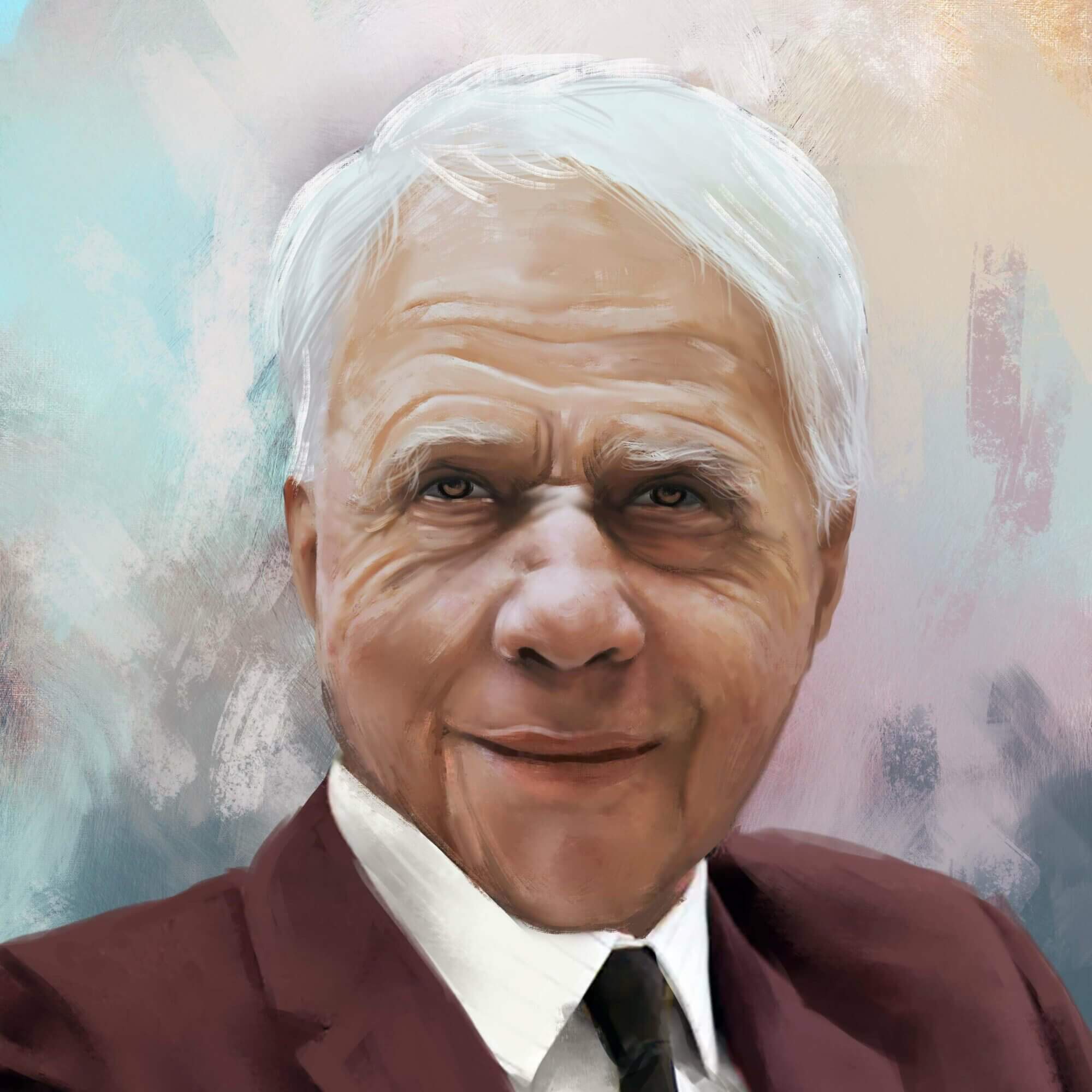Robert Frost is one of the most popular American poets of all time. His highly accessible work made him famous in his lifetime and has since solidified his place in American literary history. Among his best-known poems are ‘The Road Not Taken‘ and ‘Stopping by Woods on a Snowy Evening.’ Despite never attaining the official role, many saw Robert Frost as the unofficial poet Laureate of the United States. Frost solidified his reputation as one of the elite poets of his time with his four Pulitzer Prize wins. He was presented with the Congressional Gold Medal in 1962 after a spell as a consultant in poetry for the Library of Congress.
Frost was an extremely prolific poet of his time, releasing a remarkable 20 poetry collection throughout his career. His poetry was extremely relatable and spoke on the everyday lives of those in society, in particular in rural New England. His works would address themes that spanned the human experience. As he lived a life of tragedy and triumph, he was well-versed in the ups and downs of life, which seeped into his work, and gave a great balance to his poems.
Life Facts
- Frost was born in San Francisco, California, in March of 1874.
- He taught English at Amherst College in Massachusetts.
- His first book was published in Great Britain in 1912.
- He was awarded over forty honorary degrees, although he never graduated from a university.
- Robert Frost died in 1963.
Interesting Facts
- His father died when he was 11 years old.
- He was awarded a Congressional Gold Medal.
- He won four Pulitzer Prizes.
- The Frost home is known as The Frost Place.
- Frost accompanied the Interior Secretary to the Soviet Union, where he helped lobby for peace between the two countries.
Famous Poems
- ‘Stopping by Woods on a Snowy Evening‘ is one of Frost’s best-known poems. It was, by Frost’s own account, inspired by real events. The poet described how he was faced with a difficult choice, just as is described in the text. The woods provided an easy escape from the hardships of his life, but he had more to do before he could even consider resting.
- ‘To Earthward‘ is a clever poem that contains numerous poignant images. In the text, the speaker describes his youth and how it has continued to influence him throughout his life. He is seeking to feel something real, to turn “earthward,” and to know the full range of his emotions.
- ‘Desert Places’ discusses themes of isolation and loneliness within the context of a natural scene. In this case, the setting is a snowy landscape in which all animals are hidden, and no other travelers wander. The land is described as “empty spaces,” a fact that evokes fear in the speaker and makes him think of his own mental “desert places.”
- ‘The Road Not Taken‘ is by far Frost’s most popular. There are two paths that are set out before the speaker, and it is up to him to choose which one to travel down. The decision he makes at this moment is spoken of as if it was life-changing. At the time, he thought he might go back and try the tooth path, but he realizes that this is never going to happen.
- ‘Mending Wall‘ discusses humankind’s desire to mark off territory. This includes solidifying the outline of one’s own land, such as around a house or something larger like the border of a country. The speaker does not look kindly on this way of being. He sees it as simplistic and indicative of a more basic urge which humanity should’ve grown out of.
Explore more of Robert Frost’s poetry.
Early Life
Robert Frost was born in San Francisco, California, in March 1874. His father, William Prescott Frost, was a journalist and a descendant of an English immigrant who came to America in 1634. His mother, Isabelle Moodie, was from Scotland. In addition to journalism, Frost’s father worked as a teacher and, later, as an editor of the San Francisco Evening Bulletin. He died of tuberculosis when Frost was only eleven years old. The death of his father made the family, who were in a very poor financial state, move to Lawrence, Massachusetts.
Education
It could be said that Robert Frost’s education promised much but did not deliver, despite his clear intellect and eventual success. Frost graduated from Lawrence High School, Massachusetts, in 1892. His first poem ‘My Butterfly,‘ was published in the same year. He then moved on to Dartmouth College, in Hanover, New Hampshire, before dropping out and trying his hand at a career. He tried many jobs during this time, such as delivering newspapers and working in factories; however, his intellectual side prevailed, and he enrolled at Harvard University in 1897. Again, despite showing such promise, Frost withdrew from studies after two years due to illness. However, the lack of degrees did not deter Frost from becoming one of the great poets of his generation.
Literary Career
Frost’s grandfather, who had supported the family after William Prescott’s death, purchased a farm for Frost and his new wife, Elinor White, in Derry, New Hampshire. He worked the farm for almost a decade, writing when he could. His mother died of cancer during this interval, and his sister was committed to a mental hospital, where she was to die only a few years later.
On top of all of this, he proved to be an unsuccessful farmer and was forced to return to education. He taught at the New Hampshire Pinkerton Academy from 1906 until 1911 and then later at the New Hampshire Normal School in Plymouth. The years on the farm were some of Frost’s most productive; although they were not published at the time, he wrote a number of poems that were later to become famous.
Ready for a change, Frost and his family moved to England in 1912. It was here that Frost’s first book of poetry was published, ‘A Boy’s Will.‘ He became known to the poetic group Dymock Poets, as well as Ezra Pound. His second volume, ‘North of Boston,‘ was published two years later. Following these publications, Frost returned to America in the midst of World War I. America had only just received its copies of ‘A Boy’s Will,’ and Frost was able to set up a good life for himself and his family in Franconia, New Hampshire. The publication’s popularity solidified his reputation in America.
The home that the family resided in during this period is now known as The Frost Place and is maintained as a historic site. Throughout the 1920s, he taught English at Amherst College in Massachusetts, accepted a fellowship at the University of Michigan, Ann Arbor, and was appointed a Fellow of Letters. In 1924, he won his first Pulitzer Prize for his volume, ‘New Hampshire: A Poem with Notes and Grace Notes.’ He continued to teach, mostly on a rotating basis, at the Bread Loaf School of English of Middlebury College in Ripton, Vermont.
Writing Career and Relationships
During the 1930s, he started spending more time in the southern United States, particularly Florida. It was there that he bought a plot of land on which he would spend every winter for the rest of his life. The property was named Pencil Pines. As the decades progressed, his reputation only grew, and the prestige with which he was considered increased. He won his second Pulitzer in 1931 for ‘Collected Poems,‘ his third in 1937 for ‘Further Range,’ and finally, his fourth in 1943 for ‘A Witness Tree.‘
He was awarded over forty honorary degrees, although he never graduated from a university. In 1960 he was awarded the United States Congressional Gold Medal. This was mainly for recognition of Frost’s enriching poetry. A year later, at the inauguration of John F. Kennedy, he was called upon to read a poem. He wrote ‘Dedication‘ for this particular occasion, but due to the glaring sunlight, he was unable to read it. He recited instead, ‘The Gift Outright.’ The following year, 1962, saw Frost accompany the Interior Secretary to the Soviet Union, where he helped lobby for peace between the two countries.
Death
Robert Frost died in January 1963 due to complications from prostate surgery and was buried in Old Bennington Cemetery in Vermont.
Influence from other Poets
Robert Frost was notably influenced by writers such as Rupert Brooke, Robert Graves, and the poems of Ezra Pound.
FAQs
Robert Frost’s shortest poem released was ‘Nothing Gold Can Stay,’ which is 40 words long. The poem speaks about nature, beauty, and life itself, suggesting how quickly it can come and go.
Robert Frost was celebrated for his relatable poetry, choosing to discuss everyday themes rather than using epic conventions. Frost would write using colloquial language, reinforcing the grounded feeling of his work. His writing heavily focused on rural people and life, particularly in New England.
A wide array of characteristics can be seen in Robert Frost’s poetry, none more so than its groundedness and realism. There is a balance of humor, sadness, and many other emotions, depicting the ups and downs of the human experience.
Robert Frost had a long and eventful life, full of tragedy and triumph. One quote that summarises Frost’s view on life is, “In three words, I can sum up everything I’ve learned about life: It goes on.”
Throughout his illustrious career, Robert Frost was responsible for coming up with some iconic quotes. One of the more inspirational of those was when he said, “Freedom lies in being bold.” This quote can be applied to people from all walks of life.


